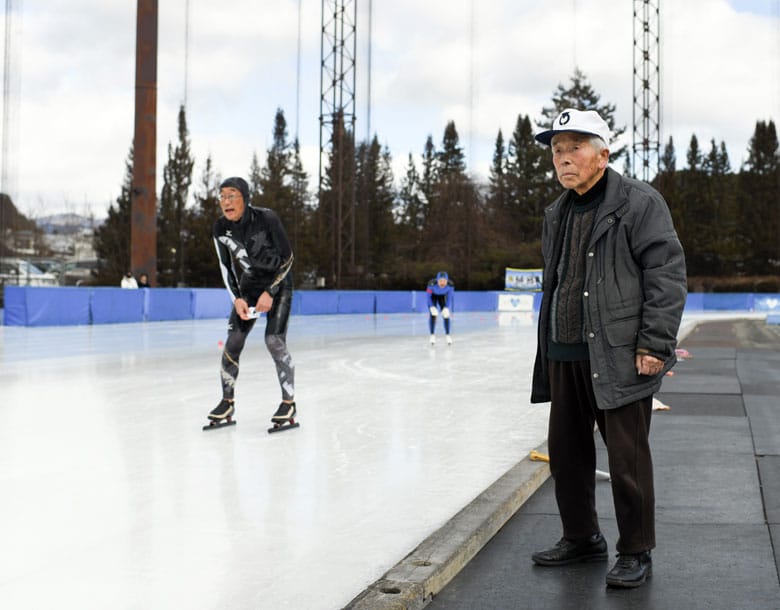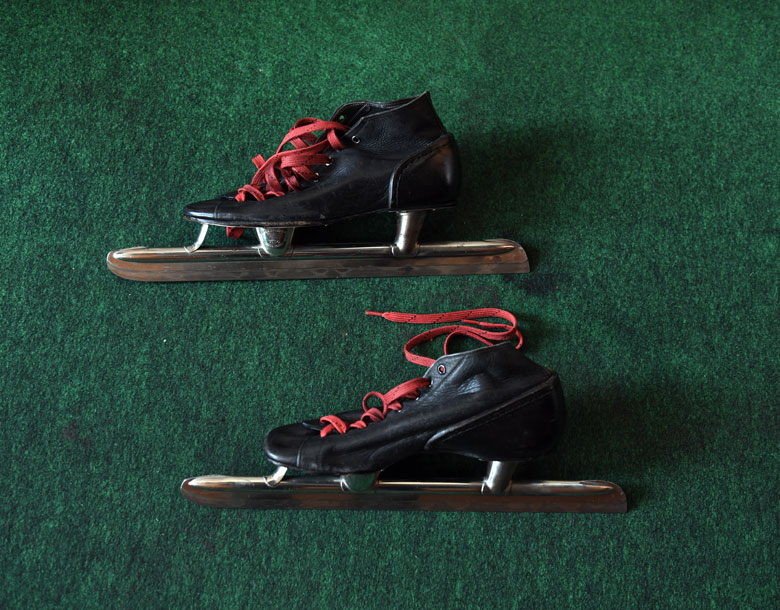When Iichi Marumo competed in his first international race seven years ago in Moscow, the Japanese speedskater moved down the ice at about the pace of a brisk jog. It took him three times longer to cross the finish line than most of the other skaters that day.
It didn’t matter, because Marumo was also three times older. He was 88, and his time was still fast enough to earn him a silver medal in his age category of 85 and older.

Ever since, he has won only gold. Now 95, in his most recent race, a national competition in Japan in January, he competed in a category that was created just for him: 95 and older.
So far, he has the category all to himself.
“I win a gold medal every time I appear,” Marumo said in an interview at his home in Chino, a small city in the rugged mountains of central Honshu, Japan’s main island. As proof, he pulled out a plastic shopping bag filled with more than 20 gold medals, including from races in the Netherlands and Canada.
A small man with slightly bowed legs and an impish smile, Marumo has been skating his whole life, but he began his competitive career at an age when most people would feel lucky to still be alive. On his wall, plaques from Guinness proclaim him to be the world’s oldest male competitive speedskater. His closest rival is a Norwegian skater who is five years younger. (The oldest currently active female competitor is an 80-year-old Dutch skater.)
The collection caps a remarkable near-century of life. Marumo survived World War II despite volunteering to fly a kamikaze mission; was awarded by Japan’s emperor for teaching other farmers how to profit by growing celery; and publishes a short monthly magazine dedicated to traditional Japanese poetry.
To be a speedskater at his age no longer involves much speed. In compression pants and a skintight race suit, he shuffles and glides down the ice, taking care not to fall. Still, he is greeted with enthusiastic cheers, which he returns with a wave and a smile.
Racing wasn’t even his idea: A friend persuaded him to do it as a sort of dare. Now, he sees it as a fun way to spend his remaining time.
“I never expected to be an international racer,” Marumo said.

He has become a minor celebrity in Japan, a demographically aging society that has seen a surging enthusiasm for senior sports. The country produces some of the world’s oldest competitors in winter events, including two Japanese women who also hold Guinness World Records as the oldest downhill and cross-country skiers. But they are still at least five years younger than Marumo.
“He stands out as the poster boy of senior winter sports in Japan and maybe the world,” said Kenji Takai, director of the Japan Association for Winter Masters Sports. “He’s inspiring people to try to do what he’s doing.”
Marumo and his fellow silver-haired athletes are also pushing the boundaries of senior sports. In speedskating, the term Masters is typically used for those age 30 years and older, but Marumo is more than three times that age.
At the Masters level, speedskating is divided into age categories that are five years long, so entrants can compete against other skaters of similar physical strength. Since Marumo’s first domestic race, in 2016 at the age of 86, Japan’s skating federation has had to create three age categories just for him, including the one for 95 and older.
“I hope he continues until we have to create a fourth new category, for those aged 100 and over,” Takai said.
Marumo says he wants to be skating when he’s 100, although he may not make it. He has had a few falls, but the worst came during his most recent race in January. The track was outdoors, and when the starting pistol sounded, a blizzard had blown in. Marumo fell early and couldn’t get back on his feet. Rather than give up, however, he crawled along the ice all the way to the finish line.
It took him 17 minutes to complete the 500-meter course.
“My left leg froze from the pain,” he recalled, “but I had to finish.”
Afterward, he announced that he was retiring from the sport before having surgery for a hernia. But he has since had second thoughts and now says he will race again next year if he feels strong enough.

Marumo said he first skated around 1940, when he was about 10. In those days, he tied handmade metal blades onto wooden sandals and raced against his elementary school classmates across frozen rice paddies. His childhood ended at the age of 15, when he was persuaded to volunteer for the kamikaze missions that Japan was launching against the advancing Americans in the closing days of World War II. Trained to be a radioman in a two-seat bomber that was to ram into a warship, but the war ended before his plane was sent.
Getting a second chance is what taught him to make the most of life, he said. After returning to the farm where he grew up, he saw a few stalks of celery growing. The vegetable was then rare in Japan, but he figured out how to make it flourish in the local soil, turning it into a cash crop in the alpine region. In 1970, the Emperor Hirohito recognized Marumo with an award for promoting agriculture.
He also became an enthusiast of tanka, a type of short poem. Marumo said the brisk rhythms resemble the martial songs that had once persuaded him to volunteer to die during the war, but he has used his poems to celebrate peace. In 2002, he took over the magazine dedicated to tanka, which he has edited and published ever since.
After the war, he kept up ice skating mainly for exercise. As a City Council member in the late 1980s, Marumo persuaded leaders to build the city’s own speedskating rink. But he never imagined that he would one day race competitively.
He was already 86 when a friend persuaded him to enter a race. “There’s no one else your age competing,” the friend told him. “You’ll get a medal just for showing up.”
Becoming a competitive racer has not changed his lifestyle, Marumo said. The skating remains his main source of exercise, and he does little or no additional training. “My philosophy is not to overdo it,” he said.
He admits travel can be exhausting, especially long flights overseas, but his forgetfulness makes it harder. He once showed up at the airport without his passport, which caused him to miss his flight — and almost the entire competition.
Still, Marumo says he is hooked on speedskating, which has become a new way to celebrate a life that was almost cut short by war — and that he’s not ready to give up on yet.
“I retired once,” Marumo said. “I don’t want to do that again.”
c.2025 The New York Times Company. This article originally appeared in The New York Times.







